The changing face of aid: A Q&A with Craig Redmond, Senior Vice President of Programs
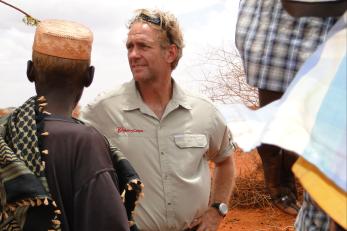
How does Mercy Corps determine where to respond when disaster hits? And how is the nature of disaster response changing?
Read more in this interview with Craig Redmond, Mercy Corps' senior vice president of programs, on the approach Mercy Corps takes to crisis, what happens behind the scenes during disaster, and what's next in the tech-driven evolution of humanitarian aid.
How did you come to Mercy Corps?
I was a Peace Corps Volunteer, then I worked for the Peace Corps in Central Asia, and then I worked on refugee issues in the Fergana Valley. I got really interested in those communities, so I started working with UNHCR trying to resettle Tajik refugees who were ethnic Kyrgyz people in Kyrgyzstan. I was interviewing NGOs to run a microfinance program for refugee women in the Fergana Valley, and Mercy Corps was one of them.
I just liked how frank the organization was and that they admitted things they didn't do well. And also — and maybe even more importantly — I liked that they seemed to be having more fun than anybody else. So I thought, you know what, when it's time to leave the UN, I'm gonna work with those guys. When that time came a couple years later, I applied to Mercy Corps and they hired me.
What were you hired to do?
We were working on the IDP refugee situation in Azerbaijan at the time, and I was hired to go to Azerbaijan and be the program director for a big umbrella grant. It was a great learning experience. There almost isn't a program-related job that I haven't done. I've managed programs, I've been a program director, I've been a country director, and I’ve been the regional director for South and Southeast Asia. I did that for a few years, and then I was asked to come and take on this job.
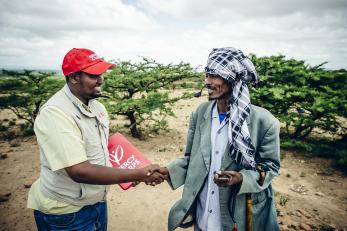
It seems like crisis response is woven into your Mercy Corps DNA.
Well it is, because we are often at our very best when things are awful. That's when I really see a distinction between how we act and how others act. We're very context-specific, context-driven. We really try not to bring a template that we lay over a situation to dictate how we act.
I think time and time again we're the most interesting people in a crisis, and there are lots of organizations who are great at emergency response, but I think we're great. What really gets interesting is our particular take on it, which is slightly different from most organizations. I think that's when we're at our creative best.
How does cash help people in crisis? Get the quick facts ▸
What's different about it in particular?
It’s our thinking, system-wide, about the dysfunction within a system that happens after an emergency. Complex emergencies have a way of simplifying economies and creating opportunities to plug communities in that didn't exist before. The one that comes to mind for me is what happened in Aceh (Indonesia) after the tsunami. There was an ongoing 30-year conflict there and the tsunami kind of made it possible for people to come together because of the enormity of what had happened.
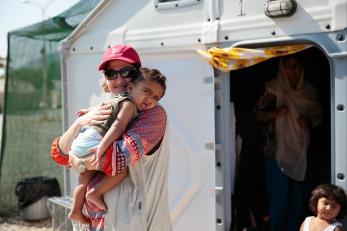
Walk through Mercy Corps’ thought process when a crisis happens. How do you know whether to respond?
There are a few easy triggers. If we're in a country and something happens at scale, we're definitely going to respond. No question about it, we'll be there. And that's because we just feel like that's our duty, our obligation, as a partner with the community, the private sector, and the government, to engage and do something about it. That doesn't mean that every single time something happens we'll respond, but we will check in with our partners, like, is this landslide big enough? Is this something you can cover? Can you bring forth the kind of resources and support we need to help the community? If not, we'll step up and help where we can.
Then you have the other global emergencies of a different kind where it may be that we're not there, but we think, you know, this is so big that we should really do something. And in that case it's a matter of triggering our SRGE (Strategic Response and Global Emergencies) team to go in and have a look at the situation. The first things they're looking at are what's being covered now, what does government have a handle on, and what don't they have a handle on, so we can perhaps bring something to the table that doesn't exist there. And then of course what partners are there that we can join forces with to do something about it.
How we're responding to the crisis in Raqqa ▸
If it's in a country where we're not working, and it's pretty clear we're probably not going to open up shop there long-term, then we really think hard about what partners we want to join forces with so they can take over what we help start. Puerto Rico would be an example of that. It's not a place where we're going to stay long-term. We're not going to stay in Houston for a long time. So who are the partners who can take over the work, and what's the essence of the solution so we can hand it over?
How is the response process different if it's a U.S. emergency, like Houston or Puerto Rico?
U.S. emergencies are really tricky. We responded after September 11 in New York with a comfort-for-kids program. Hurricane Katrina was the same. Hurricane Harvey was on a different scale, but at the same time it just felt a bit unprecedented in terms of the size of it, and then we got really interested in the fact that we knew undocumented workers were going to be underserved because they're not going to get services from FEMA and in many cases the Red Cross. We felt that was a role for us to play there — not a long-term one, not weeks, not months, and we would look to hand over to a partner. So that's what we did.
An inside look at how we're helping share warm meals in Puerto Rico ▸
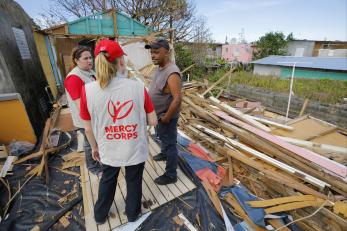
How is the response different for a timely emergency like a hurricane versus a protracted emergency like in Syria?
It’s very different because the level of sophistication in the analysis and information gathering you need to navigate something as complex as Syria is miles away from what it means to do something about the earthquake in Nepal. It's just a different kind of problem. Also, we know that when it comes to Syria or CAR or northeast Nigeria or Congo or whatever, we're in it for the longer game. We know for a fact this is not something that local government can really manage.
We feel that complex crises are events that we are singularly well-prepared to handle. We go for those things because we think our particular combination of creativity in the face of complexity, our brains and heart that our team brings to those problems, and our theory of change that works with the government, private sector, and community together positions us well in those times.
When you get a rapid influx of money, how do you prioritize what you want to go to scale?
We do it in several ways. The money usually comes in for some purpose or a certain geography. We take the strategy that we have in place and build off of that, because every country has a strategy that is fundamental to where we go with our programs there. For example, let's say that we decided to do something in Niger. We would build off our existing food security program there.
Our country directors and their teams are constantly trying to think of programs not as just projects that we implement, but rather as platforms for thinking of bigger kinds of solutions. We’re always keyed up to think about how we can leverage programs and what would happen if we were to scale up some aspect of what we were trying to do. What if we had an influx of some capital so that we could really do something interesting? Country Directors and Region Directors are good at being ready to do something interesting.
In South Sudan, the threat of famine still looms. Here's how we're helping ▸
Does anything come to mind that started as a small program that's now been scaled up?
Oh yeah. I think in every one of the regions we've had something that we did on the side that became the bigger thing we did. From my time in Southeast Asia, for sure, we were one of the first organizations to look at cash-for-work. And that came about kind of experimentally. A lot of organizations after the tsunami were distributing food and so forth, and we said, you know, we're not going to do that because we think there's something really dynamic about this market. Let's see what happens if we put cash into the system rather than stuff. And we were spot on. That revolutionized the way we think about emergency response.
I think about a place like Uganda and our work up in Karamoja in the far north. Our early work there was very much looking at basic food security, and that transformed into a broader program looking at ways of being a facilitator in a marketplace. What would it take to invest in the value chain so that goods and services could get up into Karamoja so people can access things, rather than have a standard food security program where you bring food and distribute it? Every region has those kinds of stories.
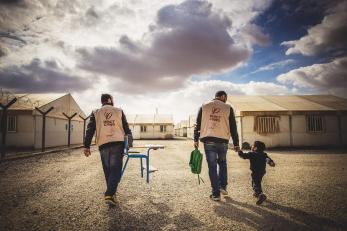
How have you seen the nature of humanitarian response change since you started in 2000?
The fundamental shift that has happened is that now an event happens and an organization shows up, and instead of it being about you and how fast you can plug in your machine and get it to run, it's about understanding the context — doing a deeper analysis of what exists and what doesn't exist so that you can add value or improve an existing system rather than just supplanting it. That's a fundamental shift in the way you see the world.
If you look at the trajectory of international development from the ’50s and ’60s, you had sort of an anthropological approach — the barefoot doctor. I’m going to come in and set up a clinic where people come in and get services. That’s a good thing to do, but what if I came in as a doctor and trained local doctors? And then, what if I assessed and understood what health services really existed and where their strengths and weaknesses were, and I tried to add value to that rather than asserting myself at all?
Those things represent a subtle shift over time, and I think now we're getting into a really interesting space where the ambiguity of technology and the speed in which things change and move means that we are facilitators in those value chains more than ever. Who does it and how it's done is agnostic. What's important is the speed and the depth of understanding and the analytical capacity of the organization, and then how fast they're able to facilitate change and understand the system and the gaps.
You have a great perspective on what Mercy Corps is doing around the world. Where do you get your satisfaction from the work?
Nothing gives me more pleasure or makes me feel better than just solving problems with the smart people we have all over the world. The thing that amazes me still is that we are in the unique position where we can take in many cases a really tragic or challenging situation, look at the conditions, look at the resources we have, and try to turn that thing around. And that to me is a fantastic opportunity and an example of the kind of puzzles Mercy Corps works through all the time. I just find that fascinating.
And then on top of that, the people that we get to work with are just extraordinary. You know, they could do anything. They could be very successful people in government or the private sector, but they want to do this. I just feel really blessed by that. To be able to work with people like that is just incredible. Recently I was in Gaza and Congo with our teams there, and they're extraordinary people who just have amazing life stories and this is what they want to do. Imagine you are Congolese and you're working in Eastern Congo, and your sole purpose is to try to create better lives for people in your community around you, and you get paid for it. It's amazing.
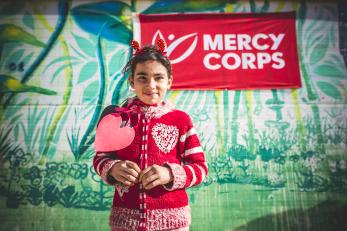
From Nepal and Syria to the Horn of Africa and beyond, Mercy Corps responds quickly to help communities around the world recover after disaster and build a stronger tomorrow.